Baidu SEO: Content is King, Citations Win
- On November 4, 2025
Preamble: The Baidu SEO Myth vs. Reality
For Western marketers, China’s digital landscape often feels like a mirror universe. Many SEO professionals, accustomed to Google’s traditional ranking model, still waste resources chasing the obsolete mantra that “Backlinks are King” on Baidu. This traditional approach, focused on mass link acquisition, is now largely ineffective and often detrimental.
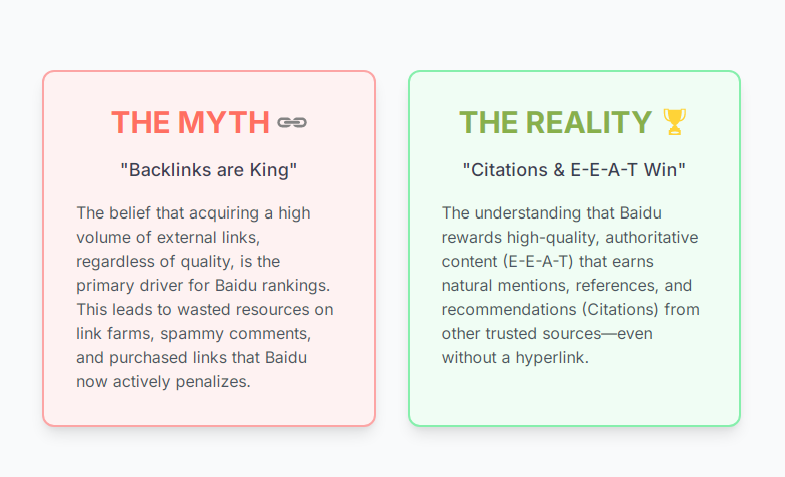
The critical question for brands aiming for visibility in China is: What are Baidu’s true ranking rules?
The core thesis of this report is that Baidu’s algorithm has evolved to align with high global standards while uniquely adapting to the realities of the Chinese internet. Baidu, like Google, places Content Quality and E-E-A-T (Experience, Expertise, Authoritativeness, and Trustworthiness) at the core of its ranking model. Consequently, the value of the easily manipulated “backlink” has collapsed, giving way to a more potent signal: the editorial Citation.
Part I: Baidu’s Alignment with Global Search – The Core Status of E-E-A-T
Baidu is the dominant search engine in China, holding an estimated 54% to 60% market share. Its success hinges on delivering reliable results, a goal that forces it to prioritize the same fundamental qualities as its global counterparts: trust and relevance.
1.1 What is E-E-A-T? A Quick Primer
E-E-A-T is not just a Google concept; it represents Baidu’s approach to site credibility and quality. Baidu employs a trust-ranking system to assess credibility, especially for critical content:
- Expertise: Content must reflect a deep, demonstrated knowledge of the subject.
- Experience: Content should be based on real-world, first-hand knowledge and practical application.
- Authoritativeness: The site/author must be recognized as a leading source in its niche.
- Trustworthiness: Information must be factually correct, secure (HTTPS is mandatory), and transparent.
This framework is most critical for YMYL (Your Money, Your Life) content, such as financial and medical pages, which are held to a substantially higher standard to prevent harm to the user.
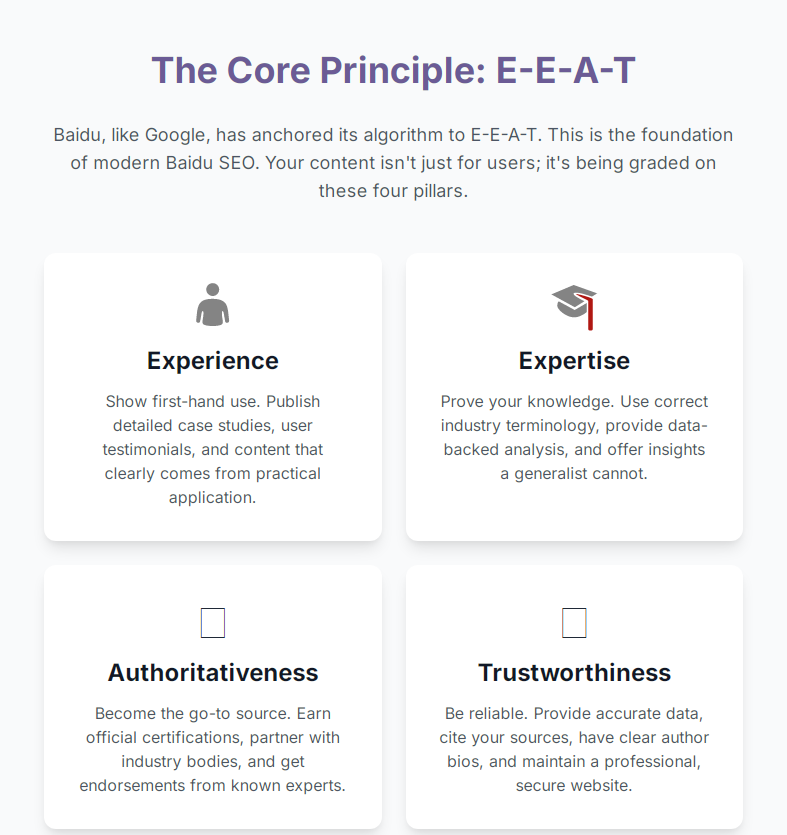
1.2 Baidu’s Official Stance: Algorithm Insights
Baidu’s major algorithm updates clearly signal its commitment to content quality and author reputation:
- Hurricane Algorithm (Jufeng): Launched in multiple phases (1.0 in 2017, 3.0 in 2019), this series of updates systematically cracked down on content scraping, plagiarism, duplicate content, and cross-domain acquisition, rewarding sites with original, high-quality content.
- Content Quality & Site Authority: Baidu’s ranking logic emphasizes a “Content Quality Score” and assesses “Site Authority”. These metrics are direct proxies for E-E-A-T.
1.3 E-E-A-T in Baidu Search Results
In practice, E-E-A-T determines survival, especially in highly sensitive sectors. When searching for YMYL topics, pages that rank highly almost always display high E-E-A-T characteristics:
- Author Credentials: Content should be prepared by an expert, and author information—including a clear author bio and institutional background—is necessary for boosting trust.
- Institutional Backing: Pages should link to clear, verifiable institutional backgrounds. For example, high-ranking YMYL pages are usually from recognized institutions with proper credentials.
Part II: The Decline of Links and the Rise of “Citations” – Baidu’s Unique Ecosystem
2.1 Why Baidu Disregards Traditional Backlinks
Baidu’s skeptical stance on backlinks stems from the history of China’s unique internet ecosystem.
- The Link Spam Epidemic: For years, the Chinese web was plagued by rampant link spam, automated link farms, purchased links, and the mass injection of links across unrelated domains.
- Algorithmic Devaluation: Baidu’s algorithm has evolved to automatically detect and devalue toxic backlinks, rather than relying on webmasters to manually disavow them. This means a high volume of low-quality links is often worthless or a negative signal.
- Prioritizing Local Signals: Baidu places a greater emphasis on in-country signals, internal links, and user interaction metrics (like time on site and social shares) over backlink quantity.
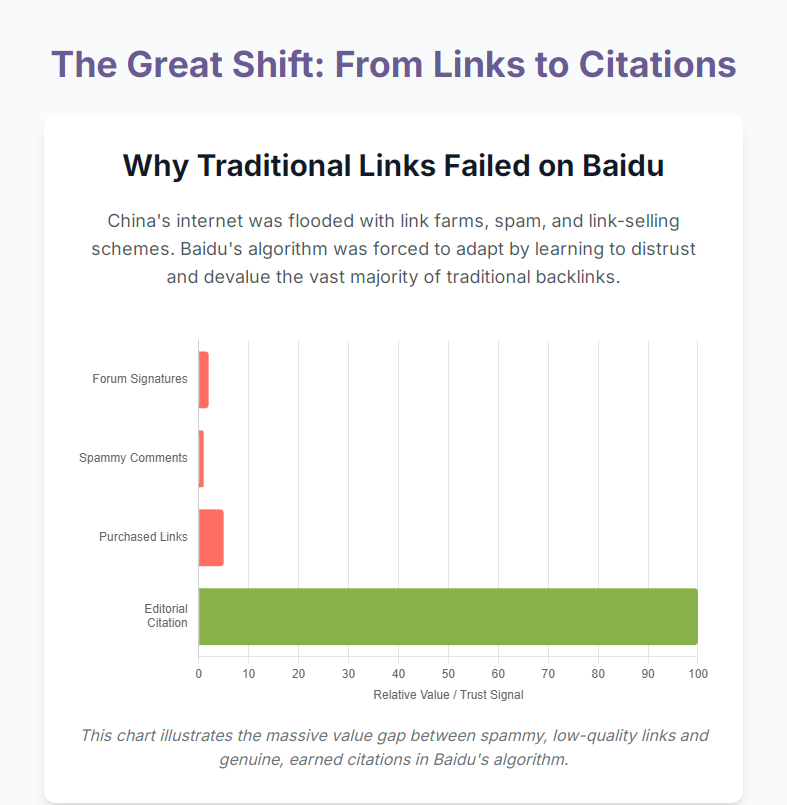
2.2 What is the High-Value “Citation”?
A Citation is a textual reference or mention of your brand, website, article, or unique data point by another reputable source, made out of genuine recognition and trust.
| Feature | Backlink (HTML Link) | Citation (Brand/Content Mention) |
| Form | An HTML hyperlink (<a> tag) |
A textual reference to the brand or content |
| Trust Signal | Often low value; easily purchased or manipulated | High value; signals genuine recognition and authority |
| Value to Baidu | Often devalued or seen as spam | Sends a strong trust signal, even without a hyperlink |
| Example | A link in a blog comment footer | A Zhihu post stating, “According to’s latest data…” |
Key takeaway: Unlike the traditional SEO focus on acquiring a clickable link, the new imperative is to be referenced and talked about across the Chinese web, even if the mention is unlinked.
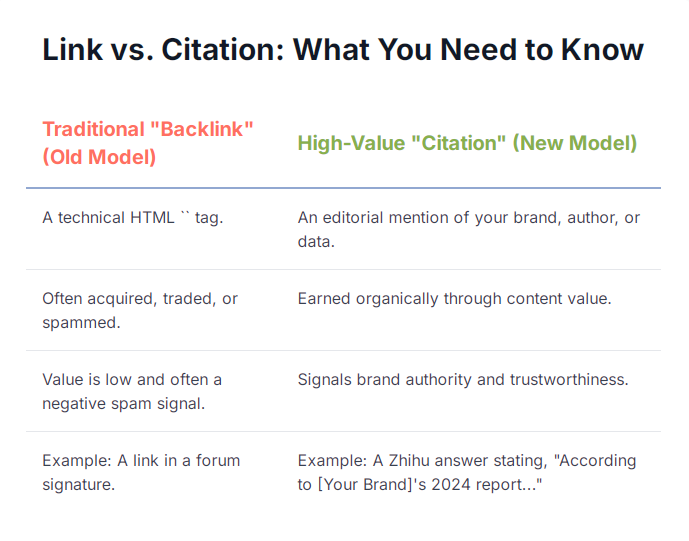
2.3 How Citations Empower Baidu SEO
Widespread Citations act as powerful authority signals within Baidu’s trust-ranking system.
- Brand Authority Signal: Citations from respected local platforms (like Zhihu or industry vertical sites) demonstrate that your brand is influential and trustworthy. Baidu views this as a direct indicator of brand strength, which in turn boosts site credibility.
- Content Value Validation: When other sites cite your content, it proves that your information is valuable, reliable, and worth referencing as evidence.
- Natural Link Building: While low-quality links are ignored, high-quality citations often accompany or lead to natural, editorially-given backlinks from trusted Chinese websites, particularly those relevant to your niche. These are the only external links Baidu genuinely values.
Part III: Practical Strategies: Building High-E-E-A-T Content to Earn Quality Citations
The shift from link hunting to citation earning requires a complete restructuring of your content strategy, focusing on building deep-seated credibility within the Chinese market.
3.1 Building the Content E-E-A-T System
Your content must be created in Simplified Chinese and tailored for Chinese users, using local references and culturally relevant examples to ensure high engagement.
| E-E-A-T Pillar | Actionable Strategy for Baidu |
| Experience | Publish case studies, demo videos, or white paper excerpts on a verified Baijiahao (Baidu’s publishing platform) account, linking back to your full article. |
| Expertise | Use local professional job titles in Simplified Chinese (e.g., 律师 for lawyer) in author bios and structured data, rather than Western acronyms like MD or MBA. |
| Authoritativeness | Secure an ICP License (if hosting in Mainland China) or use a China-optimized CDN, and actively aim for media coverage from trusted Chinese news sources. |
| Trustworthiness | Ensure HTTPS is mandatory. Build social proof by engaging consistently on Chinese platforms like Weibo and Zhihu, as these social signals contribute to Baidu’s trust assessment. |
3.2 Creating Content Formats Easy to be “Cited”
Citation-worthy content is authoritative, indispensable, and unique. Focus resources on creating assets that others must reference:
- Data Reports & Industry White Papers: Publishing unique, proprietary data or market analysis makes you the primary source for a topic.
- Depth and Detail: Top-ranking pages on Baidu are often long-form, averaging over 4,900 characters in length. Comprehensive, in-depth guides are essential.
- Authoritative Definitions and Solutions: Create the definitive “standard answer” or the most comprehensive tutorial for a specific industry problem, making your site a foundational reference point.
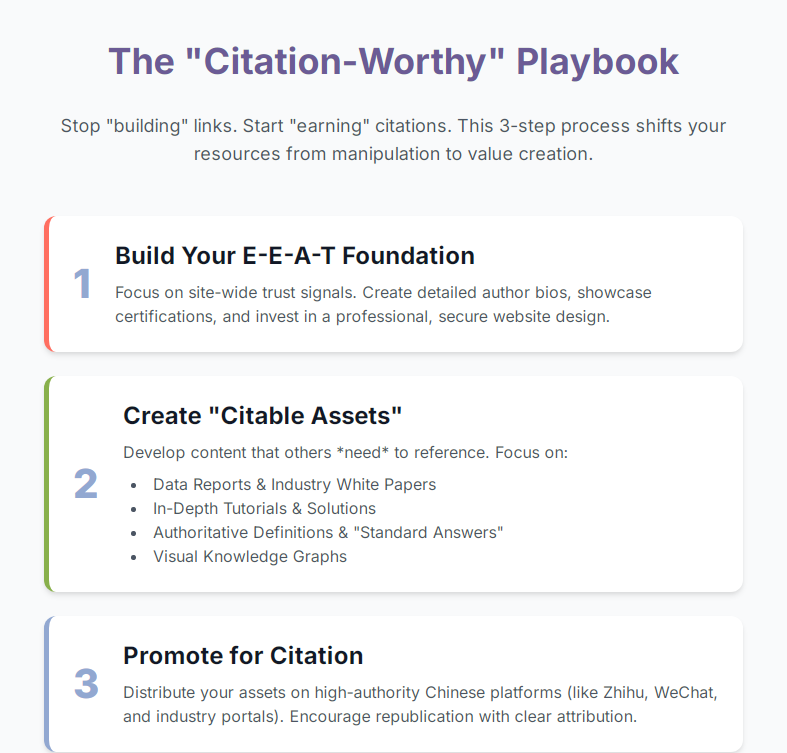
3.3 Proactive, Non-Aggressive Distribution Strategy
To generate citations, you must place your content where industry experts and users gather.
- High-Authority Platforms: Distribute excerpts or simplified versions of your content to platforms that Baidu favors, such as Zhihu (China’s Quora), Weibo, and industry-specific vertical websites.
- Brand Mentions: Encourage partners and affiliates to mention your brand and attribute your data, even if they don’t include a hyperlink. Posting high-quality news strengthens your reputation and increases Baidu’s trust in your domain.
Conclusion: Returning to the Source of Search and Trust
Baidu SEO has fundamentally shifted from “technical link manipulation” to “value-driven content creation.” The competition is no longer about who can buy the most spammy links, but whose content is the most trustworthy, comprehensive, and authoritative.
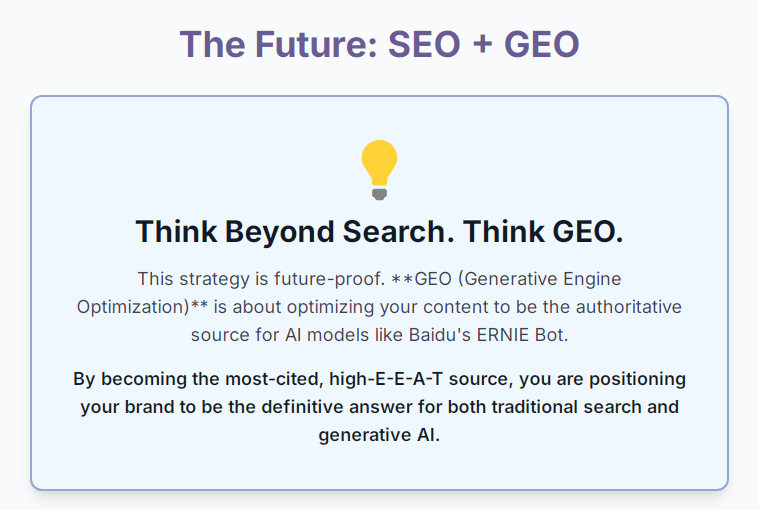
The effort invested in high-E-E-A-T content and citation building is also an investment in future search visibility:
- The Rise of GEO (Generative Engine Optimization): Generative AI models, such as Baidu’s ERNIE, are trained to extract and synthesize authoritative information. By consistently producing the most citable content, you are perfectly positioning your brand to be the authoritative source for future AI summaries, securing long-term visibility in the rapidly evolving search landscape.
Immediately pivot your resource allocation. Stop investing in ineffective link schemes and refocus your entire strategy on elevating your content’s E-E-A-T level, ensuring your site is the indispensable, authoritative source that competitors and users are eager to cite.

 Unlock 2026's China Digital Marketing Mastery!
Unlock 2026's China Digital Marketing Mastery!